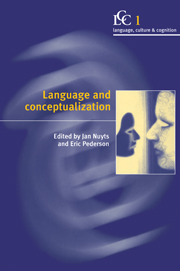Book contents
- Frontmatter
- Contents
- 1 Overview: on the relationship between language and conceptualization
- 2 From outer to inner space: linguistic categories and nonlinguistic thinking
- 3 Spatial operations in deixis, cognition, and culture: where to orient oneself in Belhare
- 4 Remote worlds: the conceptual representation of linguistic would
- 5 Role and individual interpretations of change predicates
- 6 Changing place in English and German: language-specific preferences in the conceptualization of spatial relations
- 7 Mapping conceptual representations into linguistic representations: the role of attention in grammar
- 8 Growth points cross-linguistically
- 9 On the modularity of sentence processing: semantical generality and the language of thought
- 10 The contextual basis of cognitive semantics
- 11 The cognitive foundations of pragmatic principles: implications for theories of linguistic and cognitive representation
- Subject index
- Index of names
10 - The contextual basis of cognitive semantics
Published online by Cambridge University Press: 05 June 2012
- Frontmatter
- Contents
- 1 Overview: on the relationship between language and conceptualization
- 2 From outer to inner space: linguistic categories and nonlinguistic thinking
- 3 Spatial operations in deixis, cognition, and culture: where to orient oneself in Belhare
- 4 Remote worlds: the conceptual representation of linguistic would
- 5 Role and individual interpretations of change predicates
- 6 Changing place in English and German: language-specific preferences in the conceptualization of spatial relations
- 7 Mapping conceptual representations into linguistic representations: the role of attention in grammar
- 8 Growth points cross-linguistically
- 9 On the modularity of sentence processing: semantical generality and the language of thought
- 10 The contextual basis of cognitive semantics
- 11 The cognitive foundations of pragmatic principles: implications for theories of linguistic and cognitive representation
- Subject index
- Index of names
Summary
Introduction
In presenting the theory of cognitive grammar (Langacker 1987, 1990a, 1991), I have often encountered the misconception that cognitive linguistics is unconcerned or even incompatible with the study of language in its social, cultural, and discourse context. My description of conceptualization as the locus of meaning and the basis for grammar is commonly taken as implying that contextual factors are unimportant, if not excluded altogether. While it is understandable how this impression comes about, my stated position is actually quite the opposite (1987: chs. 2, 4, 10). My purpose here is thus to explain just why and to what extent a conceptual view of meaning can nonetheless be contextually grounded. The topic raises a variety of fundamental theoretical issues: the location and nature of linguistic knowledge; the relationship among language, cognition, and culture; the place and role of the conceptualizer in semantic structure; and the degree of compositionality exhibited by complex expressions.
Language and minds
Assuming that it is useful for certain purposes to talk about ‘a language’, the question arises as to where such an entity might be located. Could it be, for example, that a language resides entirely in individual minds? This is one way to interpret a basic notion of generative theory, which regards the ‘grammar of a language’ as a discrete module of psychological organization (the output of the ‘language acquisition device’).
Information
- Type
- Chapter
- Information
- Language and Conceptualization , pp. 229 - 252Publisher: Cambridge University PressPrint publication year: 1997
Accessibility standard: Unknown
Why this information is here
This section outlines the accessibility features of this content - including support for screen readers, full keyboard navigation and high-contrast display options. This may not be relevant for you.Accessibility Information
- 39
- Cited by
